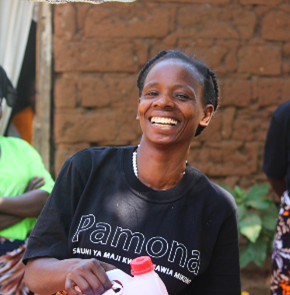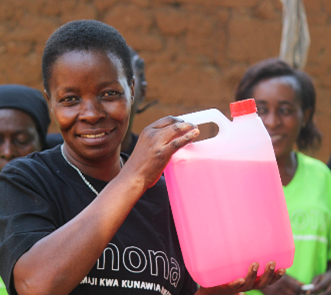Success Story
Stories from Tanzania COVID-19 Response: New health-related business enterprises improve the well-being of Pilikapilika Group members
September 22, 2022
In response to the COVID-19 pandemic in Tanzania, NPI EXPAND implemented a grants program that supported three new and underutilized local partner NGOs for about 6-8 months from July 2020-April 2021. The three NGOs supported 25 WORTH Yetu community groups to add to their income generating activities by producing, promoting, and selling non-medical masks and sanitation products (liquid soap, hand sanitizer). The following story comes from one of these groups. You can read more about the COVID-19 program and lessons learned on our website here.
More than a year after spending their group money in acquiring chairs and utensils to launch a leasing venture, members of Pilikapilika Group in Mwanza’s Kirumba district were discouraged by the business’s low returns. Following the leasing business’s subpar performance, the members’ next major idea was to branch out into catering in order to service their leasing firm clientele and, ideally, generate better margins from their investment. Members could not agree on committing finances to the new enterprise due to questions regarding its viability. “We didn’t want to take a chance on a business where we weren’t confident we’d generate enough money. Because our capital had not grown as much as we had intended from the leasing business, our first inclination was to safeguard the little we had raised,” recalls Ms. Tabia, one of the group members.
MOCSO, a Mwanza based NGO that had supported the group in the past recognized their unity and business orientation, thus selected them for COVID-19 interventions. When they were introduced to the idea of making masks and soap through the project, they said they were ready for their next business venture.
Ms. Tabia, who sells fish and attended the soap-making training, recounts the group’s situation before the initiative. “For a long time, we were mulling over what our next business endeavor should be. Many of us were dissatisfied with size of our collective fund, which meant we could only get tiny loans. We sought to put our money in enterprises that would provide a higher return that we could utilize to increase our credit-issuing capability.”
In 2019, the group launched its first business but did not maintain accurate records of expenses and income, mostly due to lack of awareness. Most members consider the business training they received from T-MARC eye-opening.
Magret Tadei, who had received training in soap making, explains how the group benefited from the training. She says: “Previously, we didn’t understand the distinction between revenue and profit. We occasionally felt we were gaining money when we were actually losing it. With the right training, the soap-making business has proven to be far more successful than we could have imagined. We have made TZS 3,150,000 from the business alone since its inception.”
Carolina Michael, who had prior tailoring skills, impressed a church Bishop with a sample mask that she took for marketing, and received an order of large quantities of masks for church service centers. Carolina earned TZS 1.7 million from these church orders, which she used to purchase a property on which she is constructing a home for herself and her family.
Members of the organization may now acquire a loan worth up to three times their savings because their capital has risen dramatically. This has provided enormous relief to members such as Ms. Tabia. “I used to struggle to pay my rent,” she recalls:
“It was difficult to accumulate enough money with renters wanting six months’ rent at a time. What I could borrow from the group was limited and did not meet all my requirements. With the additional group earnings, I was able to borrow enough to fund my fish vending business, which is now stable and helping me to fulfill my rent payments.”
Carolina Michael (L) and Magret Tadei (R), women members of the Pilikapilika group in Nyamagana, Mwanza. Their successful mask and soap businesses have significantly increased the size of their collective fund, enabling individuals to get bigger loans for personal projects.

